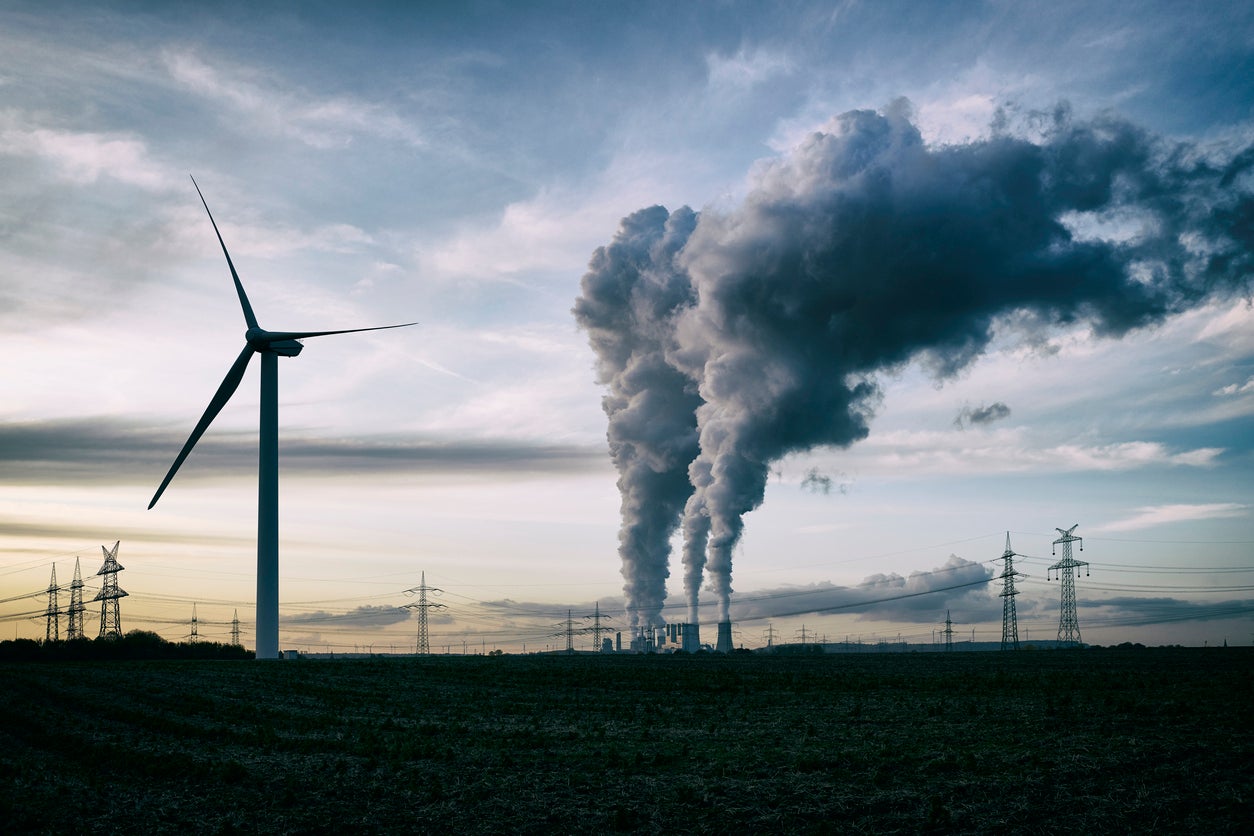Levels of planet-warming greenhouse gases reach new high despite Covid lockdowns
‘We are way off track’ in meeting climate goals, World Meteorological Organization says

Levels of planet-warming greenhouse gases recorded in the earth's atmosphere reached record levels last year despite lockdowns in countries around the world, according to UN scientists.
Researchers at the World Meteorological Organization (WMO) said concentrations of carbon dioxide, methane and nitrous oxide rose by more than the annual average in the past 10 years.
The dire revelation comes just days before world leaders gather at the crucial Cop26 summit in Glasgow, where they will attempt to make progress on climate change.
The crisis talks look to be in an increasingly perilous state, with President Xi of China and Russian President Putin - whose countries are among some of the worst emitters of harmful gases - unlikely to attend.
Analysts fear the absence of Mr Putin and Mr Xi will result in both China and Russia failing to commit to new climate targets.
Meanwhile, the United States - the world's second biggest polluter of greenhouse gases - is struggling to pass legislation seen as crucial to achieving the country's ambitions on emissions.
Earlier on Monday UK prime minister Boris Johnson, who is hosting this year's summit, admitted that he is "very worried" about the summit and admitted it was "touch and go" whether agreements will be made.
Britain was among a number of countries around the world to introduce strict lockdown measures as Covid hit early last year, closing businesses and factories for weeks on end.
But the economic slowdown caused by Covid did not have any discernible impact on atmospheric levels of greenhouse gases and the rate they are building up, although there was a temporary decline in new emissions, the WMO said.
If greenhouse gas concentrations continue to increase at current rates, the world will see temperature rises far above globally agreed long-term targets to limit warming to 1.5C to 2C to avoid the worst impacts of climate change.
Greenhouse gases are emitted by human activities such as burning fossil fuels for power, heating and transport, farming and deforestation, and they build up in the atmosphere where higher concentrations of the gases trap more heat, causing rising temperatures, extreme weather and rising seas.
WMO secretary general Professor Petteri Taalas said the latest information on greenhouse gases contained a stark, scientific message for climate negotiators at the Cop26 talks, adding: "We are way off track."
The last time the Earth had similar concentrations of carbon dioxide (CO2) in the atmosphere was three to five million years ago when the temperature was 2C-3C warmer than now, and sea levels were 10-20 metres higher - but there weren't 7.8 billion people living on the planet then, he warned.
Prof Taalas said: "Many countries are now setting carbon neutral targets and it is hoped that Cop26 will see a dramatic increase in commitments.
"We need to transform our commitment into action that will have an impact on the gases that drive climate change.
"We need to revisit our industrial, energy and transport systems and whole way of life.
"The needed changes are economically affordable and technically possible. There is no time to lose."
The latest annual greenhouse gas bulletin from the WMO shows that levels of carbon dioxide - the most important greenhouse gas - in the atmosphere reached 413 parts per million in 2020, 49 per cent above what it was in 1750, before human activity started affecting natural systems.
Concentrations of other key greenhouse gases methane and nitrous oxide also hit record highs in 2020, as they increased at faster rates than in the past 10 years.
Roughly half the carbon dioxide emitted by human activities remains in the atmosphere, while the other half is absorbed by oceans and land habitats such as forests.
But the bulletin warns that these carbon-absorbing "sinks" may become less effective in the future, reducing their ability to take carbon dioxide out of the atmosphere and buffer the planet from even greater warming.
The bulletin has been published as world leaders and negotiators prepare to gather in Glasgow for the Cop26 climate conference in less than a week, where countries will be under pressure to take greater action to cut emissions of the greenhouse gases that are driving rising temperatures.
Responding to the report, Prof Dave Reay, the director of Edinburgh Climate Change Institute, University of Edinburgh, said the true success or failure of Cop26 would be written in the skies in the form of greenhouse gas concentrations.
"This new report from the WMO provides a brutally frank assessment of what's been written there to date. So far, it's an epic fail," he said.
The "small window of opportunity" to stabilise greenhouse gas concentrations at a level that meets global goals to curb rising temperatures was about to vanish, he warned.
Dr Heather Graven, reader in climate physics at Imperial College London, said: "These atmospheric measurements provide hard evidence that, rather than slowing climate change, we are accelerating it.
"Greenhouse gases in the atmosphere are increasing faster than ever.
"It is crucial that Cop26 succeeds in ramping up mitigation efforts across the globe," she said.
Cop26, the 26th UN climate change conference, gets underway in Glasgow on 31 October. Last year's event was postponed due to the pandemic.
World leaders are aiming to agree on measures to improve commitments made in the landmark 2015 Paris Agreement, which committed countries to keep global temperatures "well below" 2.0C (3.6F) above pre-industrial times and "pursuing efforts" to limit temperature rises to 1.5C.
PA
Join our commenting forum
Join thought-provoking conversations, follow other Independent readers and see their replies
Comments
Bookmark popover
Removed from bookmarks